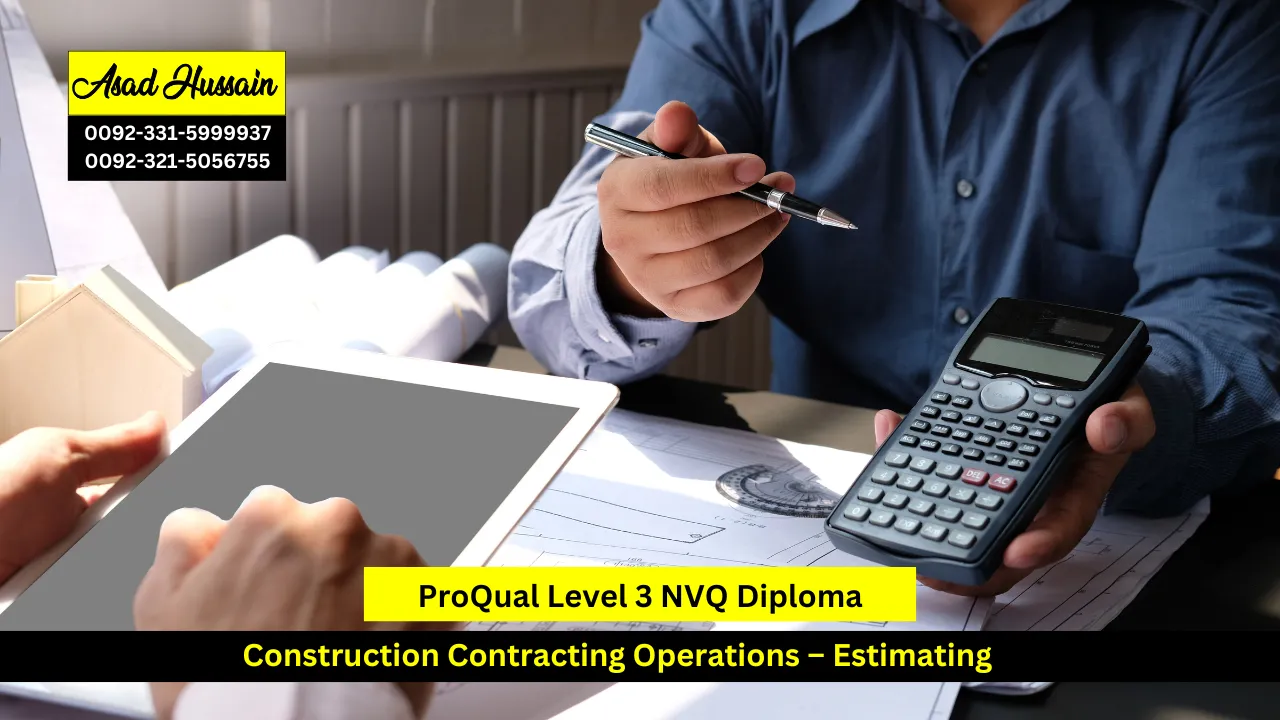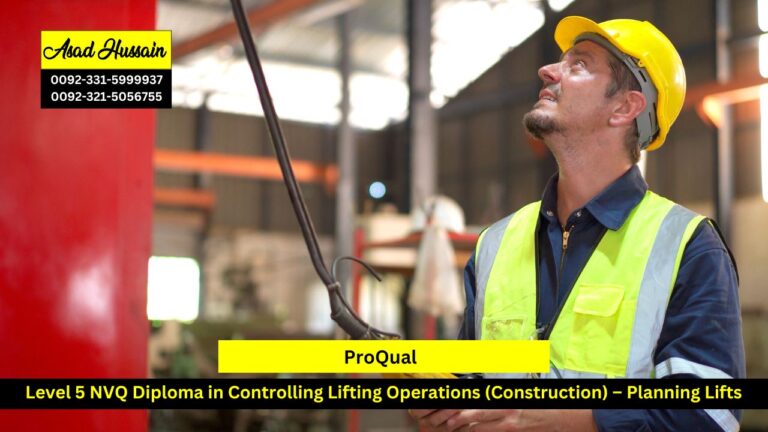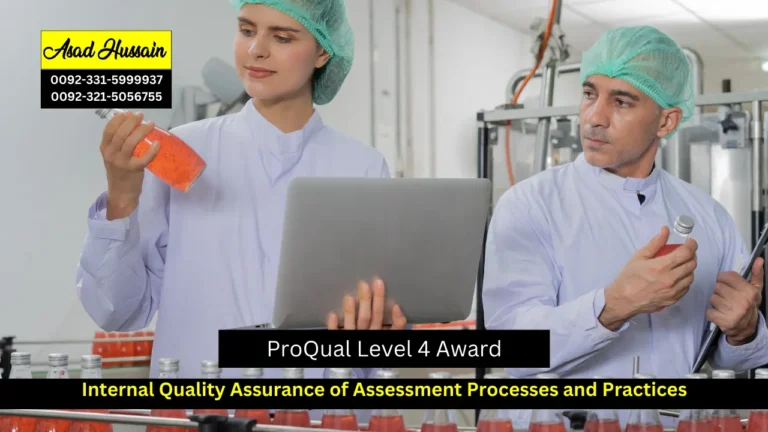The role of an estimator in construction is both technical and strategic, requiring a sound understanding of cost planning, tendering, and project specifications. The ProQual Level 3 NVQ Diploma in Construction Contracting Operations – Estimating is specifically designed to recognise the skills of professionals working in this critical function. It provides a nationally recognised qualification that validates practical expertise and supports career development within the UK construction industry and beyond.
The ProQual Level 3 NVQ Diploma in Construction Contracting Operations – Estimating is a competence-based qualification regulated by Ofqual. It is tailored for individuals who are already working in a construction estimating role and wish to gain formal recognition of their occupational skills through a structured assessment process.
The ProQual Level 3 NVQ Diploma in Construction Contracting Operations – Estimating is an ideal qualification for professionals looking to formalise their expertise and advance in the construction industry. With a strong emphasis on practical assessment and industry relevance, it is a valuable investment for any individual involved in cost estimation and tendering processes.
Program Highlights
Mandatory Units
- Operate Health, Safety and Welfare Systems in Construction
- Prepare Programmes and Schedules of Work in Construction
- Operate Project Information Systems in Construction
- Develop and Maintain Working Relationships and Personal Development in Construction
- Prepare and Process Invitations to Tender in Construction
- Prepare Estimates, Bids and Tenders in Construction
Optional Units –
- Prepare For, Collect, Analyse and Present Survey Data in Construction
- Record the Condition of Property in Construction
- Integrate and Control Project Design Information in Construction
- Prepare Drawings and Schedules in Construction
- Prepare for Work Operations in Construction
- Implement Contract Work in Construction
- Establish and Maintain the Dimensional Control of Construction Works
- Prepare For and Carry Out Physical Testing in Construction
- Assess, Plan and Monitor Project Methods and Progress in Construction
- Monitor, Maintain and Improve supplies of Materials in Construction
- Recommend and Monitor Supplies of Plant and Equipment in Construction
- Prepare and Monitor Costs and Accounts in Construction
- Prepare Proposals and Obtain Feedback for the Provision of Products and Services in Construction
- To enrol in the ProQual Level 3 NVQ Diploma in Construction Contracting Operations – Estimating, candidates must meet the following criteria:
- Minimum Age
- Learners must be at least 19 years of age at the time of enrolment.
- Educational Background
- There are no formal academic qualifications required.
- A basic understanding of construction principles, drawings, and cost planning is recommended to support successful completion of the course.
- Work Experience
- Candidates must be currently employed in a relevant role within the construction industry.
- You should be actively involved in tasks such as estimating, tender preparation, cost analysis, or quantity take-offs, allowing you to demonstrate occupational competence through real work-based evidence.
- Language Proficiency
- Learners must have a good command of the English language, both written and verbal.
- For non-native English speakers, proficiency at CEFR Level B1 or above is recommended to ensure understanding of technical terminology and effective communication during assessment.
Operate Health, Safety and Welfare Systems in Construction
- Apply legal and organisational requirements for health and safety
- Identify hazards and implement effective control measures
- Promote a safe and healthy work culture on-site
- Monitor and maintain welfare provisions in line with regulations
Prepare Programmes and Schedules of Work in Construction
- Develop logical work schedules using project planning tools
- Identify critical tasks and resource requirements
- Monitor and adjust schedules to align with project progress
- Communicate schedules effectively to stakeholders
Operate Project Information Systems in Construction
- Use digital systems to collect, manage, and share construction data
- Maintain accurate and secure project documentation
- Support collaborative working through effective data management
- Ensure version control and accessibility across the project lifecycle
Develop and Maintain Working Relationships and Personal Development in Construction
- Establish and nurture professional relationships with team members and clients
- Resolve conflicts and encourage team collaboration
- Assess personal performance and plan for continuous improvement
- Promote respect, inclusivity, and productive work environments
Prepare and Process Invitations to Tender in Construction
- Develop comprehensive tender documentation based on project specifications
- Manage the invitation and submission process in line with procedures
- Evaluate tenders for compliance and suitability
- Support fair and transparent contractor selection processes
Prepare Estimates, Bids and Tenders in Construction
- Calculate detailed cost estimates based on scope and resources
- Compile competitive bids tailored to client requirements
- Prepare professional tender submissions within regulatory frameworks
- Analyse risk and profitability in proposed bids
Optional Units
Prepare For, Collect, Analyse and Present Survey Data in Construction
- Plan and conduct accurate site surveys
- Analyse collected data for construction planning
- Present findings in technical formats such as charts and maps
- Use survey data to support project decisions
Record the Condition of Property in Construction
- Conduct property inspections to identify defects and wear
- Document property condition with visual and written records
- Recommend necessary repairs or maintenance
- Produce accurate and usable condition reports
Integrate and Control Project Design Information in Construction
- Coordinate multiple sources of design information
- Ensure timely communication and update of design changes
- Resolve conflicts in technical drawings and plans
- Maintain comprehensive and accessible design records
Prepare Drawings and Schedules in Construction
- Create clear technical drawings using industry software
- Translate project specifications into visual formats
- Align drawings with construction timelines and stages
- Ensure compliance with regulatory and project standards
Prepare for Work Operations in Construction
- Identify equipment, materials, and personnel needs for site activities
- Develop and communicate detailed work plans
- Ensure all site preparations are completed before operations begin
- Address logistical challenges proactively
Implement Contract Work in Construction
- Interpret and implement the terms of construction contracts
- Oversee project work to meet contractual obligations
- Monitor performance and resolve non-compliance issues
- Maintain accurate records of contract execution
Establish and Maintain the Dimensional Control of Construction Works
- Set out works according to plans and specifications
- Conduct regular checks to ensure dimensional accuracy
- Adjust works to maintain alignment with design requirements
- Record measurement data for quality assurance
Prepare For and Carry Out Physical Testing in Construction
- Select appropriate testing procedures for materials and components
- Conduct tests in line with health and safety regulations
- Accurately record and interpret test results
- Use outcomes to ensure construction quality and compliance
Assess, Plan and Monitor Project Methods and Progress in Construction
- Evaluate construction methodologies for efficiency and safety
- Develop work plans that meet time, cost, and quality objectives
- Monitor work against project benchmarks
- Adjust methods and schedules to stay on track
Monitor, Maintain and Improve Supplies of Materials in Construction
- Track material usage and ensure timely replenishment
- Identify inefficiencies and reduce material waste
- Liaise with suppliers to maintain quality and availability
- Implement systems to improve stock management
Recommend and Monitor Supplies of Plant and Equipment in Construction
- Assess needs for machinery and tools based on project demands
- Recommend suitable equipment and monitor its usage
- Maintain performance and service records
- Ensure safe and efficient operation of all equipment
Prepare and Monitor Costs and Accounts in Construction
- Develop cost plans and monitor actual expenditure
- Track financial performance and highlight variances
- Maintain accurate accounts for auditing and reporting
- Support budget control and project financial health
Prepare Proposals and Obtain Feedback for the Provision of Products and Services in Construction
- Develop detailed proposals aligned with client needs
- Gather and analyse feedback from stakeholders
- Refine proposals based on evaluation and input
- Present proposals professionally for decision-making
ProQual Level 3 NVQ Diploma in Construction Contracting Operations – Estimating is designed for professionals working in or aspiring to work in estimating roles within the construction industry. This course validates practical skills and knowledge required to perform estimation tasks in real construction environments.
This course is ideal for:
- Junior and assistant estimators looking to gain formal recognition of their skills
- Site technicians or construction operatives aiming to transition into estimating roles
- Experienced workers seeking a nationally recognised qualification through work-based assessment
- Individuals responsible for preparing cost estimates, tenders, and budget plans
- Employees supporting procurement and pricing activities within construction companies
- Professionals involved in contract pricing, material and labour cost analysis
- Apprentices and trainees pursuing a structured pathway into construction estimating
- Anyone wishing to enhance their career prospects in quantity surveying, cost engineering, or project finance within the construction sector
This qualification is suitable for learners who are currently employed and wish to demonstrate their competence in a real-world construction setting, without the need for classroom-based learning.







